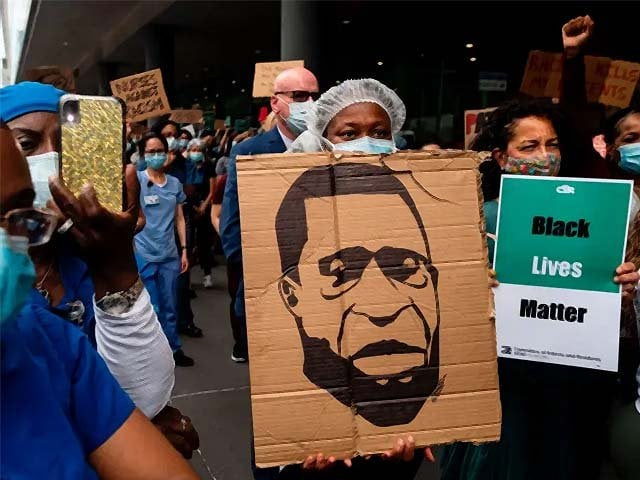First, it was shock. Then, sadness. Finally, it was anger. This was my succession of emotions after watching the death last month of George Floyd in Minneapolis. My anger and that of the millions of people who have marched since Floyd’s death is pointed at not only the police whose violent actions instigated the protests but also towards a justice system that disproportionately criminalises people of colour. The anger I saw in my small town and across the country after several incidents of police brutality against black people was understandable.
I am a nearly 50-year-old white man. I grew up in an overwhelmingly white town just outside of Minneapolis, the same city where Floyd lived and died. As a kid, I went to a suburban school with a mostly nearly completely white student body. There was just one black student in my high school of 1,000 students, an African refugee who lived with a white family. That childhood made me a non-expert in the experiences of minority Americans.
My New England town’s recent protests were loud and emotional. Leaders used bullhorns to chant slogans like “No justice, no peace!”, “Black Lives Matter!” and the words Floyd uttered just before he lost consciousness, “I can’t breathe!”. The protests were attended equally by local university students and year-round residents, like me. While the reason of the event was disheartening, seeing so many united towards one cause was the only uplifting thing about it. So much anger, sadness and frustration were expressed at those protests. Unlike the protests that too easily make national or world headlines, there were no confrontations, and uniformed police were smart to be unseen and to watch it from afar.
After graduating from high school, I left Minneapolis to study the criminal justice system. My favorite class assignment required me to spend time with a police officer while they patrolled their community in police car, commonly called a “ride-along”. I had a very positive and fascinating experience, and I learned so much about what police officers see and do and the amount of discretion they use in every interaction with the community, whether it be with a suspected criminal or a concerned citizen.
Since my formal education ended, my interest in the criminal justice system has continued. I did more “ride-alongs” in both small towns and in cities lived in by millions of people. While talking to the officers, they actually admitted to me that they pre-judged people based on their race. One officer in Los Angeles, California said that since crimes in the officer’s patrol area were disproportionately committed by young men of colour, the police had to take race into account when they responded to 9-1-1 calls. Indeed, while I was with that officer, he stopped a car for a possible violation that was driven by a young black man. The driver was upset with the officer because he felt like they were being pulled over for the non-crime of “driving while black”. A police helicopter even hovered over the scene and blasted a high-intensity spotlight on them, thus increasing the tension. The driver was ultimately let go with a warning.
That ride-along happened 20 years ago. It was also just a few years after the widely-publicised police beating of motorist Rodney King and the subsequent riots in Los Angeles when the officers involved were acquitted. Sadly, the anger that people of colour feel towards the police in many communities has grown since then and culminated in the recent protests in my town and across the country and the world.
In the eight years I’ve lived here, I’ve heard many of the year-round residents proudly profess their socially and politically progressive values, as well the town’s long history of protests in support of social causes, minorities and other oppressed groups. A family friend has lived here for 40 years. He has an successful career in the federal government. He fixes up old cars as a hobby and proudly drives them around town. But he has been repeatedly stopped by the local police not because he broke a law but because they are suspicious of him, a black man, for driving an expensive car. People have also come by his house while he’s gardening and asked to speak to the owner, as if an informally-dressed black man couldn’t be the one who owned the house. His experiences are not isolated in our town. Racism is indeed everywhere.
What causes racism? Since I’m not steeped in academic disciplines that study and debate human behaviour, I can only speak from my own experiences. I believe racism results from one thing: fear. The majority race feels threatened in some way (economically, socially) and thus creates a system, directly and indirectly, that keeps that minority in a category that will keep them unequal.
A simplistic explanation of systemic American racism: the majority race (White) feel they have their culturally and economically superior positions threatened by minorities (Black, Latino, Asian, Native American, etc.). Through both aggressive and passive acts, oppressive policies and laws, and racist language, the majority keeps the minorities in the lower socioeconomic classes. The majority race claims that since the United States (US) is a land of opportunity for those that are self-motivated, the minorities’ lower socioeconomic status is due to the minorities’ own faults. This sickening circle has continued to feed itself ever since the US was built on the labour of African slaves, the exploitation of Asian Americans in early industry and the theft-via-treaty of Native American lands, to name a few.
The phrase “Black Lives Matter” and the organisation of the same name, started in 2013 after the acquittal of a man accused of murdering teenager Trayvon Martin in Florida. The phrase simply states that the lives of black people are as important as those of whites. What it doesn’t state is that black lives are more important than any other kind of human life. In fact, as far as social movements go, simply asking to be respected as a human is not radical. It’s a very low bar of achievement, and that should illustrate how bad things are for black Americans. However, the opponents of Black Lives Matter would like the phrase to be associated with radical elements and violent protest in order to marginalise and isolate the movement away from mainstream acceptance.
What is needed today from the racial majority is empathy, not fear. Curiosity and listening are needed, not judgment and hostility. If that starts to happen more widely as a result of the recent protests, just maybe the next emotion I feel will be hope.
Tackling racism in America
As far as social movements go, simply asking to be respected as a human is not radical

Nurses and healthcare workers attend a ‘Black Lives Matter’ rally in front of Bellevue Hospital. PHOTO: AFP


COMMENTS
Comments are moderated and generally will be posted if they are on-topic and not abusive.
For more information, please see our Comments FAQ